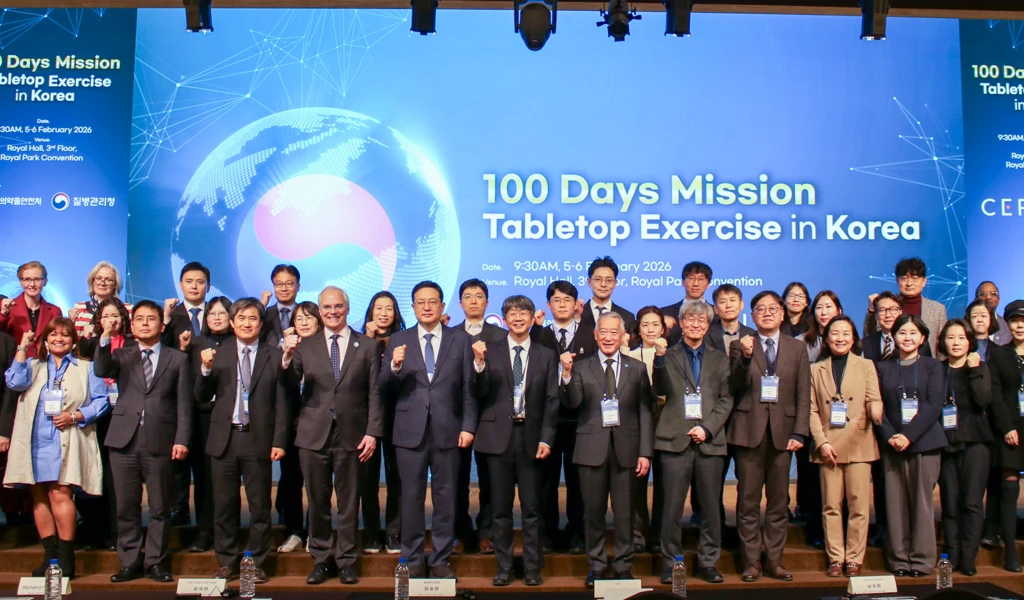- Global consortium expands research to develop a broadly protective coronavirus vaccine
- The research will be led by the International Vaccine Institute and funded by CEPI
- Coronaviruses are behind some of the deadliest outbreaks in recent years, including COVID-19
OSLO/ SEOUL, 14 May-An international consortium of researchers developing a vaccine against troublesome COVID-19 variants will receive additional CEPI funding to investigate whether it could also protect against other deadly coronaviruses.
Scientists at the International Vaccine Institute (IVI), an international organization headquartered in South Korea, will lead the new work testing whether a messenger RNA (mRNA) vaccine candidate that has already undergone early assessment supported by CEPI and others against Omicron, Delta and Alpha variants could be modified to also successfully protect against a broader array of viruses related to COVID-19.
Coronaviruses are behind some of the deadliest outbreaks in recent decades: SARS spread to multiple countries from 2002-2004, MERS first identified in 2012 has led to thousands of cases predominantly in the Middle East region, and the COVID-19 pandemic continues to cause vast global suffering.
In recognition of another potential serious coronavirus outbreak, the IVI-led team have expanded the design of their COVID-19 variant vaccine so that it also contains mRNA molecules encoding for the spike protein of several other known high-risk coronaviruses or modified coronavirus constructs.
Researchers have hypothesized that presenting spike proteins (known as immunogens) of multiple high-risk coronaviruses to the human body could induce high levels of broadly protective antibodies (a form of immune response). Preclinical data of such a vaccine design approach suggest that immune responses can be induced to neutralize several coronaviruses including those found in pangolins and bats*. The vaccine then could potentially provide protection against current and emerging COVID-19 variants as well as novel or as-of-yet undiscovered related SARS coronavirus with potential transmission from animal hosts to humans.
“The creation of a single vaccine that can target multiple coronavirus members at the same time would be an important step forward within coronavirus preparedness efforts” said Dr In-Kyu Yoon, Acting Executive Director of Vaccine R&D, the Coalition for Epidemic Preparedness Innovations (CEPI). “It has the potential to shorten the time and money spent continually updating vaccine formulations when new coronavirus variants emerge. This project is one of fourteen broadly protective coronavirus vaccine candidates that CEPI has supported."
CEPI will top up its investment, initially made in 2022, to support the expansion of the project through preclinical to Phase II clinical trials. CEPI will altogether invest up to US $23.9m in the vaccine candidate.
French-Thai manufacturing group BioNet and universities from US (University of Pennsylvania, University of North Carolina, University of California Davis) and Thailand (Chulalongkorn University) are joining forces with IVI to further the research.
The vaccine candidate being tested by the consortium is built on a mRNA platform, the rapid-response technology validated for the first time during the COVID-19 pandemic. Given its speed and flexibility, mRNA is a key component to enable a rapid response to future emerging infectious disease outbreaks, such as those that may be caused by known and novel coronaviruses.
Dr Jerome Kim, Director General of IVI, added: “In a world where novel viruses emerge and then quickly evolve with devastating consequences, the science must keep up and respond. The discovery of the mRNA vaccine platform significantly shortened the acute phase of the COVID-19 pandemic, and the flexibility of this new technology opened the door to a new generation of agile and potentially broadly protective vaccines. IVI is thrilled to lead this research consortium in pursuit of an innovative mRNA vaccine that protects against not only SARS-CoV-2 and its variants but other known and even unknown coronaviruses that may potentially make the jump from animals to humans and cause widespread illness.”
CEPI is committed to enabling equitable access to the vaccines it funds. Under the terms of the agreement, IVI has committed together with the consortium partners, to achieving equitable access to the outputs of this project, in line with CEPI’s Equitable Access Policy. BioNet will offer the opportunity for affordable vaccine doses. Future considerations for technology transfer to producers in other low- and middle- income countries is also agreed.
ENDS
*https://pubmed.ncbi.nlm.nih.gov/34214046/
https://www.sciencedirect.com/science/article/pii/S2211124723003376?via%3Dihub
https://www.nature.com/articles/s41564-023-01359-1
Notes to Editors
- CEPI first joined forces with the global consortium of researchers, then led by the French-Thai BioNet team, in January 2022 to create a vaccine that could provide protection against a range of emerging COVID-19 variants.
- Find out more about the threat of coronaviruses and CEPI’s response in our ‘The Viral Most Wanted’ series.
About CEPI
CEPI was launched in 2017 as an innovative partnership between public, private, philanthropic and civil organisations. Its mission is to accelerate the development of vaccines and other biologic countermeasures against epidemic and pandemic threats so they can be accessible to all people in need. CEPI has supported the development of more than 50 vaccine candidates or platform technologies against multiple known high-risk pathogens or a future Disease X. Central to CEPI’s pandemic-beating five-year plan for 2022-2026 is the ‘100 Days Mission’ to compress the time taken to develop safe, effective, globally accessible vaccines against new threats to just 100 days.
About IVI
The International Vaccine Institute (IVI) is a non-profit international organization established in 1997 at the initiative of the United Nations Development Programme with a mission to discover, develop, and deliver safe, effective, and affordable vaccines for global health.
IVI’s current portfolio includes vaccines at all stages of pre-clinical and clinical development for infectious diseases that disproportionately affect low- and middle-income countries, such as cholera, typhoid, chikungunya, shigella, salmonella, schistosomiasis, hepatitis E, HPV, COVID-19, and more. IVI developed the world’s first low-cost oral cholera vaccine, pre-qualified by the World Health Organization (WHO), and developed a new-generation typhoid conjugate vaccine that also achieved WHO prequalification in early 2024.
IVI is headquartered in Seoul, Republic of Korea with a Europe Regional Office in Sweden, an Africa Regional Office in Rwanda, a Country Office in Austria, and a Country and Project Office in Kenya. IVI additionally co-founded the Hong Kong Jockey Club Global Health Institute in Hong Kong and hosts Collaborating Centers in Ghana, Ethiopia, and Madagascar. 40 countries and the WHO are members of IVI, and the governments of the Republic of Korea, Sweden, India, Finland, and Thailand provide state funding. For more information, please visit https://www.ivi.int.



.webp)
